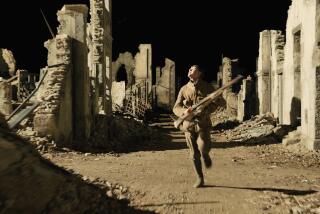The Civil War From a Horse’s Mouth : TRAVELLER <i> by Richard Adams (Alfred A. Knopf: $18.95; 248 pp.)</i>
- Share via
This Englishman, Richard Adams, who made rabbits perform wonders in “Watership Down” and turned mongrels into heroes in “The Plague Dogs” has now dared to come to the United States and write a novel as though it were told by Gen. Robert E. Lee’s horse, Traveller. Well, who else could do it better?
The story begins a few years after the Civil War, with Traveller reminiscing to Tom Nipper, a cat who frequently visits his stable. The place certainly is Lexington, Va., where Lee has become president of Washington College, although Traveller never says so. He is vague about place names throughout his autobiographical tale, such things being of slight importance to horses.
After a brief account of early life, Traveller tells of his first meeting with Lee, who was a minor general during the beginning months of war. They meet for a second time in May, 1862, at the Seven Pines battle in which Joe Johnston, the commanding general, is badly wounded. Lee is then offered the high command and reluctantly accepts. Although Lee has two other horses, he gradually comes to depend upon Traveller as they endure together through Chancellorsville, Fredericksburg, Second Bull Run and other great battles in Virginia, and the long marches to the ordeals of Antietam and Gettysburg.
The charm of the book comes from the developing personality of Traveller. When he gets going on one of his colorful battlefield narrations, he becomes an equine Huckleberry Finn, using the idiom, grammatical looseness, and attitudes of that classical American hero of the 19th Century. With his “quite a passel of,” “he knowed,” “it warnt,” and “I seed,” he trots and gallops through one scrape after another.
He gives nicknames to most of his master’s generals, who are constantly arriving at and departing from headquarters. Longstreet is Old Pete, A. P. Hill is Red Shirt, Jeb Stuart is Jine-the-Cavalry, Pickett is Ringlets. Although real names are seldom used, the individuals become known through their horses, who converse with Traveller while hitched at headquarters. Another device used by Adams to aid readers are occasional insertions of editorialized news bulletins to establish dates, places, and names of battles.
Traveller never talks with human beings, although he listens to their conversations, sometimes understanding, but sometimes not. His remarks to Tom Nipper are monologues; the cat never speaks. The horse’s pose is that of a garrulous war veteran trying to explain to a civilian what it was like to be worn out from marching, starving on half rations, and standing up to the storm and smoke of battle.
Although Traveller learned to tolerate the big bangs of the artillery, he admits that he never overcame his fear of the shaking Earth. He hated the discomforts of army life, the shortages of oats and sugar, and he could never understand why the men in gray and the Blue Men wanted to kill each other. After watching long ranks of opposing soldiers marching in close formation into each other’s deadly fire, he is convinced they are all crazy.
A persistent optimist, Traveller is confident throughout his three years of hard army life that Gen. Lee is accomplishing whatever it is he has set out to do against the Blue Men. As the months pass, he becomes so attached to the general that he believes Lee would prefer to be a horse himself because he seems so much like a horse. Traveller’s depiction of his beloved master in the later months is a bit too syrupy, too good to be true. But unlimited loyalty is the hallmark of a good horse.
When Lee brings his broken army to Appomattox to surrender to Grant, Traveller is surprised to see him actually meeting and talking with the Blue Men in front of a house. After the officers go inside, he is puzzled as to why they stay so long, and finally decides the Blue Men have grown so tired of running up and down the country and being shot at that they want to quit. He reckons that his master must be giving them a good scolding before sending them on their way.
After the coming of peacetime, Traveller has but one regret. He remembers the day when the men started running about, shouting joyfully that they were going to War. At the time, he wondered where War was, and on his first march into the mountains, he believed the soldiers were going there, but they turned about and never reached the place. After that, Lee took him into all those battles, and he never did get to see War, a place that he visualized as wonderful for horses and men.
Like most of Richard Adams’ books, this one is for all ages. To be entertained by “Traveller,” readers need not be knowledgeable about the Civil War, but those who dislike talking animals, especially animals who use backwoods speech, may not care for it. “Traveller” is by no means a history of the war, but the viewpoint is refreshing, and a reader is unlikely to find elsewhere such vivid short descriptions of the wilderness or the retreat of Lee’s army from Gettysburg. And the book certainly makes clear how and why the Confederacy lost.
More to Read
Sign up for our Book Club newsletter
Get the latest news, events and more from the Los Angeles Times Book Club, and help us get L.A. reading and talking.
You may occasionally receive promotional content from the Los Angeles Times.









